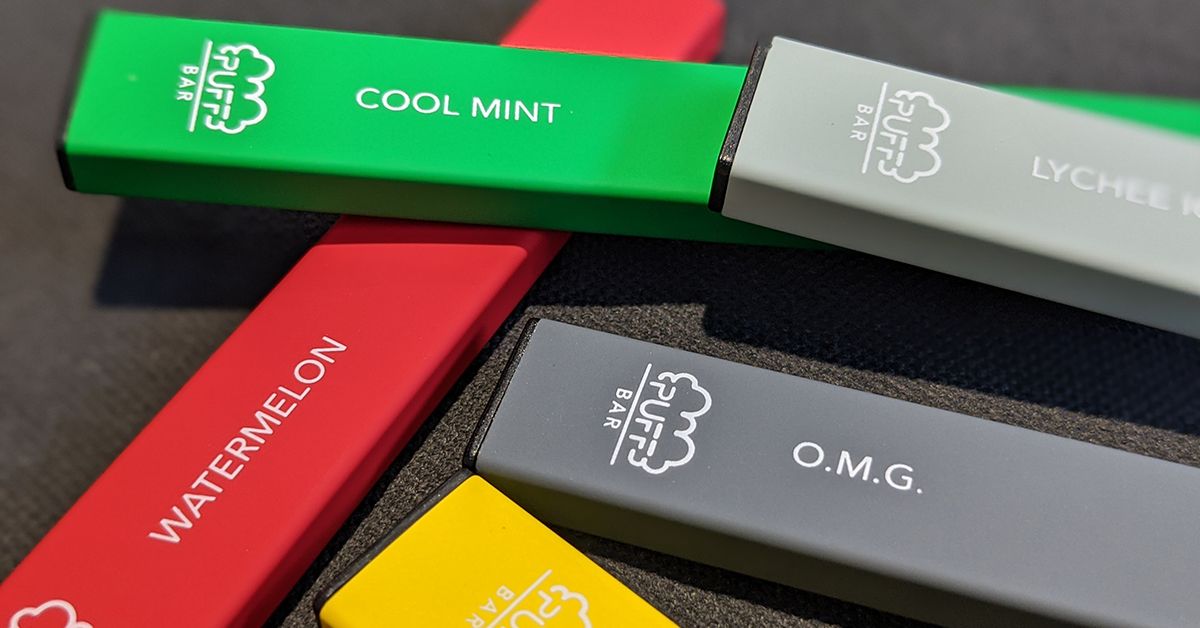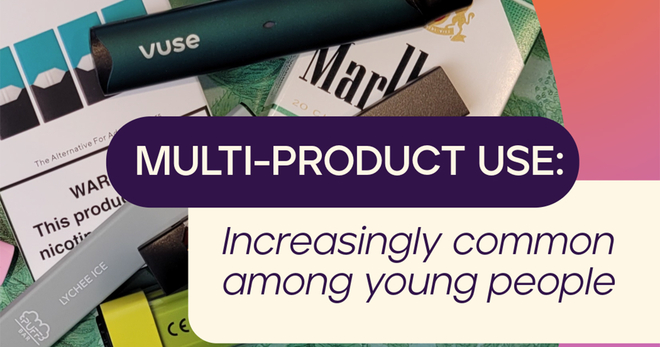What is synthetic nicotine and what does it mean for the youth vaping epidemic?
Manufacturers of e-cigarettes and other nicotine products were using synthetic nicotine to exploit a regulatory loophole and keep selling the types of sweet and fruity flavored products that ignited the youth vaping epidemic that continues today. Fortunately, that loophole is closing.
Synthetic nicotine, which is created in a laboratory and not derived from tobacco, has become increasingly popular. A new paper from Stanford University identified six manufacturers of synthetic nicotine and 98 brands claiming to contain synthetic nicotine.
Many e-cigarette makers that used tobacco-derived nicotine have recently switched to synthetic nicotine to avoid regulation by the Food and Drug Administration (FDA). For example, Puff Bar, the top vape brand among youth, was told by the FDA in July 2020 to stop selling their flavored, tobacco-derived e-cigarette products. In March 2021, the company returned to the market with synthetic “tobacco-free nicotine.”
As the FDA reviews thousands of applications from e-cigarette manufacturers to determine whether their products can stay on the market, brands that claim they use synthetic nicotine, including Puff Bar, have skirted this review process. According to the Stanford researchers, some brands even returned to the market with claims of synthetic formulations after the FDA denied their applications for tobacco-derived nicotine products and ordered them to stop selling those products.
As youth vaping continues at epidemic levels, synthetic nicotine threatens to worsen the youth nicotine use crisis. Here are important things to know about synthetic nicotine and how companies are using it to try to evade federal oversight aimed to protect youth.

Is synthetic nicotine regulated by the FDA?
Is synthetic nicotine regulated?
The short answer is now yes. On March 11, 2022, Congress passed, and the President signed language into law that clarified that synthetic nicotine products must be regulated by the FDA’s Center for Tobacco Products in the same way that tobacco-derived nicotine products are regulated.
When these products first came onto the market, some companies claimed that synthetic nicotine products did not have to be regulated by the FDA. While this was not accurate, the FDA was slow to determine how it would regulate these products and it was unclear whether these products would be regulated as tobacco products or drugs. Products containing tobacco or tobacco-derived nicotine must be regulated by the Center for Tobacco Products which is guided by the public health standard. Because synthetic nicotine is not derived from tobacco, it was a question as to whether they would have been regulated by the Center for Drug Evaluation and Research which uses a different standard based on safety and effectiveness. With the change in law, it closes the regulatory gap surrounding synthetic nicotine products and ensures that synthetic nicotine and tobacco-derived nicotine products are all regulated under the Center for Tobacco Products using the same standard. (Note: Some products that are considered drugs, such as Nicotine Replacement Therapies used to help people quit tobacco, are regulated under FDA’s Center for Drug Evaluation and Research and must go through CDER’s approval process for safety and effectiveness.)
Are products with synthetic nicotine the same as “tobacco-free” products?
Synthetic nicotine vs tobacco nicotine
Synthetic nicotine products are not alone in their prominent marketing as “tobacco-free” products. Products that are promoted as tobacco-leaf free or “extracted from tobacco” include Velo, on!, Rogue, Zyn, and Lucy. These products are not synthetic because they use nicotine derived from tobacco, but they are marketed similarly, including with claims like “clean” and “pure,” which may be misleading to consumers. Increasingly popular oral nicotine products are frequently marketed as tobacco-free alternatives to smoking, claims that could imply lower-risk and are not authorized by the FDA, according to a recent Truth Initiative analysis of direct mail advertisements.
Both types of products are marketed as “tobacco-free” because they don’t contain any tobacco leaf, but they both contain nicotine, which, regardless of its source, we know can be harmful to young people’s brain development.
Is synthetic nicotine safe?
Is synthetic nicotine safe?
It is too early to know whether the health effects of synthetic nicotine are different than those of tobacco-derived nicotine. Many studies have been done to develop a robust understanding of the health effects of nicotine derived from tobacco, but more research is needed to learn the level of toxicity of synthetic nicotine. In addition, many of the chemical methods through which companies such as Puff Bar make the synthetic nicotine their products contain are unknown.
We do know that these products threaten to addict more young people. Nicotine use during adolescence can disrupt the formation of brain circuits that control attention, learning, and susceptibility to addiction. Research has shown early age of smoking and pleasurable initial experiences are correlated with daily use and lifetime nicotine dependence.
Many vape brands are profiting from misconceptions among young people that synthetic nicotine is a safe alternative to nicotine derived from tobacco.
How available are synthetic nicotine products?
Where can I buy Zyn?
The new Stanford paper found that synthetic nicotine is widely available even on platforms that prohibit tobacco sales. Online marketplaces Google Shopping, Target, eBay, Amazon, which all prohibit tobacco product sales, sell synthetic and tobacco-free nicotine products.
Stanford researchers also found that underage sales of “tobacco-free” nicotine products are common via major online stores. Selling tobacco products to young people under 21 is illegal in the U.S., but the Stanford study found that a 14-year-old could purchase tobacco-free oral nicotine pouches online from the brand 2One.
Truth Initiative strongly urges the FDA to remove from the market all unauthorized nicotine products – regardless of the source of nicotine.
More in emerging tobacco products
Want support quitting? Join EX Program
By clicking JOIN, you agree to the Terms, Text Message Terms and Privacy Policy.
Msg&Data rates may apply; msgs are automated.


